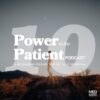In vitro fertilization (IVF) has been a major breakthrough in fertility science over the past few decades.1 People who previously were unable to have biological children due to fertility problems or because they were single or in a same-sex relationship now have a viable option for pursuing pregnancy.
However, getting pregnant and giving birth through IVF comes with unique risks, such as pain from the procedure and an increased likelihood of twins or triplets. Plus, the medications used to induce ovulation and prepare your body for pregnancy can cause side effects, such as mood changes or a heightened risk of preeclampsia. And finally, we still have a lot to learn about how these treatments might affect the long-term health of your child.
Here’s what you need to know about IVF, how well it works, and what side effects to expect from IVF medications.
What Is IVF and How Is It Done?
The IVF procedure requires more than just medication. It’s a combination of fertility-inducing drugs and procedures to help a woman become pregnant and bring a baby to full term. It’s the main type of assisted reproductive technology (ART),2 which is any type of fertility treatment in which a woman’s eggs are handled for the purpose of fertilization.3 At its simplest, IVF involves a specially trained doctor extracting eggs from a woman’s ovaries, collecting sperm from a man and combining them in the lab to form an embryo.
After the eggs and sperm are placed together in a petri dish, fertilization occurs and embryos are formed. These can be frozen for later use or implanted into a woman’s uterus to carry the pregnancy. Depending on the reasons for using IVF, donor eggs, donor sperm, or a surrogate may be used to carry the pregnancy to term.
Preparing the Eggs
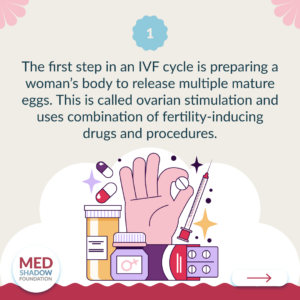
The first step in an IVF cycle is preparing a woman’s body to release multiple mature eggs.4 This is called ovarian stimulation. While most women release only one mature egg per month, during the IVF procedure, your fertility specialist will try to harvest 10 to 20 eggs at once. This will give you a greater chance of creating a healthy embryo.
To do this, you will likely first be started on fertility-enhancing medications for some time, including one or more of the following:
- Clomid (clomiphene citrate)
- Femara (letrozole)
- Follicle-stimulating hormone (FSH) and luteinizing hormone (LH)
- Gonadotropin-releasing hormone (GnRH) agonists or antagonists
Retrieving and Fertilizing the Eggs
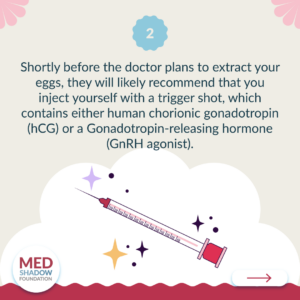
Shortly before the doctor plans to extract your eggs, they will likely recommend that you inject yourself with a trigger shot,5 which contains either human chorionic gonadotropin (hCG) or a GnRH agonist.6 This injection causes the release of natural hormones that stimulate the eggs to mature.
Then, the doctor will sedate you and guide a needle through your vagina to your ovary to extract the eggs.4
Sperm Collection
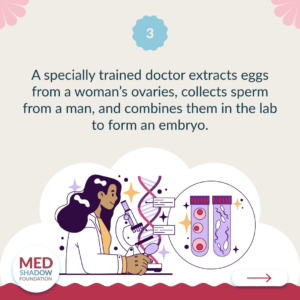 Once the eggs are retrieved, sperm is needed to make an embryo. This sperm can come from a partner or a donor. Most commonly, a man will be asked to masturbate in a private room in an office to provide sperm. However, in some cases, men have blockages or other conditions that prevent their ejaculate from containing sperm. A doctor may then extract sperm using a needle to aspirate it out of the testes or through a surgical procedure.7 A local or general anesthesia will likely be given when this happens.
Once the eggs are retrieved, sperm is needed to make an embryo. This sperm can come from a partner or a donor. Most commonly, a man will be asked to masturbate in a private room in an office to provide sperm. However, in some cases, men have blockages or other conditions that prevent their ejaculate from containing sperm. A doctor may then extract sperm using a needle to aspirate it out of the testes or through a surgical procedure.7 A local or general anesthesia will likely be given when this happens.
Implanting the Embryo
At this point, the eggs will either be frozen to preserve them or immediately fertilized with sperm in a petri dish. Once fertilization has occurred, a catheter will be used to place the embryos into the uterus.4 
Acupuncture and IVF
“There’s somewhere in the ballpark of 50 plus clinical trials that have been conducted adding acupuncture to an IVF,” says Beau Anderson, PhD, a professor at Pace University who studies integrative and complementary medicine. “And the conclusion from all of that research is that acupuncture does improve IVF outcomes, but only if there is a sufficient dosage of acupuncture.”
A review of 38 trials including nearly 6,000 participants found that acupuncture during IVF was associated with improved pregnancy and live birth rates, especially when it was administered more often and during the controlled ovarian hyperstimulation phase of treatment. The mechanisms through which IVF improves pregnancy outcomes aren’t quite clear, but some studies have suggested that it can help by reducing anxiety and improving blood flow to the reproductive organs.
Side Effects of IVF Medications
Your specialist may prescribe several different medications throughout the IVF process. These include drugs that promote ovulation, drugs that help eggs mature, and anesthesia for sedation during invasive procedures.
The drugs used to stimulate ovulation have been used since the 1960s, but the ways those medications are used to help people get pregnant and bring babies to term have changed considerably since that time.1 We are still learning about the side effects of these treatments.
For example, the results of some studies had suggested that medications such as clomiphene and progesterone may raise the risk of ovarian cancer. But when researchers reviewed the findings from multiple studies, they found the evidence was of low quality and not convincing.8 Most studies included less than 20 cases, and at least one lacked a control group. In fact, the conditions that lead to infertility to begin with are often considered risk factors for ovarian cancer, a fact that many of the early researchers did not account for in their clinical studies.
IVF Success Rate Graphic
What is the Biggest Risk of IVF for the Woman?
Ovarian hyperstimulation syndrome (OHSS) is a complication that happens in about 1 to 5% of IVF cycles.6 When you use drugs to stimulate ovulation, your ovaries can respond too powerfully.9 As your ovaries swell and become larger than usual due to the medication, they can become painful. In most cases, OHSS is mild and will go away on its own, though your doctor will still want to monitor it closely. However, severe cases can result in blood clots and strokes. OHSS can also cause ovarian torsion, a painful condition involving twisting of the ovary, which cuts off its blood supply. That can lead to low blood pressure, anemia and nausea, and it may require surgery to treat.
Clomiphene citrate

Clomiphene citrate is a drug commonly used to help stimulate ovulation by raising the levels of LH and FSH.10 You’ll usually begin your dosing five days into your menstrual cycle and take it once a day for five days.
Side Effects of Clomiphene Citrate
The most serious risks of taking clomiphene citrate include
- Multiple pregnancies (having twins or triplets)
- Low platelet counts
- Inflammation of the pancreas
- Increased risk of certain cancers
- Liver damage
- Visual disturbances
- OHSS
More common but less severe side effects of clomiphene citrate include
- Headache
- Blurry vision
- Dizziness
- Gastrointestinal distress
- Hot flashes
- Worsening of mood disorders
- Breast tenderness
- Abnormal uterine bleeding
- Pelvic pain
- High triglyceride levels
Letrozole
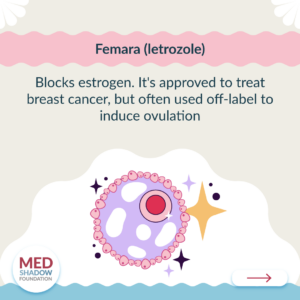
Letrozole blocks estrogen, and doctors prescribe it for both breast cancer treatment and to induce ovulation.11 There has been a lot of research on using it for infertility treatment,12 and the American College of Gynecologists recommends it as a first-line treatment (before clomiphene)13 to induce ovulation14 in women with polycystic ovary syndrome (PCOS), but it still isn’t approved by the U.S. Food and Drug Administration (FDA) for this indication. Using it for infertility is considered off-label. In fact, you shouldn’t take it after becoming pregnant, as the FDA label states it could harm your fetus.
Like clomiphene, you would take letrozole once a day for five days.
Side Effects of Letrozole
Side effects15,12 of letrozole, when used for infertility, include
- Fatigue
- Dizziness
Gonadotropins (FSH and LH)
You may be prescribed injections of either FSH alone or a combination of FSH and LH to stimulate ovulation.16
A 2017 review of 22 trials found evidence suggesting a higher risk of OHSS with gonadotropin use (6%) than there was with clomiphene or letrozole (0.5 to 2.5%).17
Side Effects of Gonadotropins
Common side effects of FSH injections (Gonal-F):
- Headache
- Ovarian cysts
- Nausea
- Upper respiratory tract infection
- Vascular disorders
A few individuals on AskAPatient.com reported bloating and abdominal pressure after taking the drug. People who report side effects on the site are self-selected and do so voluntarily, so their experiences are not necessarily representative of the general population.
You may also experience
- Abnormal menstrual bleeding
- Breast pain
- Increased risk of multiples (twins or triplets)18
Common side effects of a combined FSH and LH injection (Menopur) include
- Abdominal cramps
- Enlarged abdomen
- Abdominal pain
- Headache
- Injection site pain and inflammation
- OHSS
You might also experience:
- Blood clots
The FDA labels for both types of injections (Gonal-F and Menopur) state that patients have experienced spontaneous abortions, ovarian neoplasms, ectopic pregnancies, and birth defects. However, it is unclear whether these heightened risks of IVF are due to the medications or the patients’ underlying causes of infertility.
Trigger Shot
Your doctor may prescribe a gonadotropin injection that stimulates LH production, which tells your eggs to mature and your ovaries to release them.
Side Effects of Trigger Shots
The side effects of these shots overlap with those of other treatments often given during IVF.19 They include
- OHSS
- Growth or rupture of existing ovarian cysts
- Multiple births
- Blood clots
Progesterone
Some doctors prescribe progesterone supplements during the first 10 weeks of gestation.6 These come as pills you can swallow, injections, vaginal suppositories or topical gels. Experts say the pills are less effective than the other forms, and injections are the least likely to cause abnormal vaginal bleeding.
Some of these treatments are available over the counter (OTC), while others are prescription-only.
In 2023, the FDA removed Makena (17-alpha hydroxyprogesterone caproate), a prescription-only synthetic form of progesterone that was prescribed to prevent preterm birth whether or not the parents had used IVF, from the market20 after it was proven not to prevent preterm birth.21
Read more about Makena:
From DES to Makena and More: The Dangers of Endocrine Disruptors
Makena Found Not Effective at Reducing Preterm Birth
Any Pregnant Woman Having Taken Makena Needs to Keep Medical Records
Dee Davidson, FDN-P, now a functional health practitioner, had her first child through IVF. During the last two months of the pregnancy, she developed high blood pressure and was no longer able to exercise. She had to have her blood pressure measured multiple times per week. Additionally, having been passionate about diet and exercise her whole life, she was frustrated when she gained around 70 pounds that wouldn’t budge after she delivered her son. Davidson eventually found a specialist in hormonal health that helped her lose weight and even inspired her to pursue functional health as her own career. After that, she went on to conceive her second child without fertility treatments.
Side Effects of IVF for Babies
We still have a lot to learn about how IVF might impact babies.
Are Stillbirths More Common in IVF?
One in 175 births22 in the U.S. is a stillbirth—the loss of a pregnancy after 20 weeks gestation—whether or not the mother used IVF, according to the Centers for Disease Control and Prevention (CDC).23 A meta-analysis of 10 studies found that women who used IVF to conceive were more likely to have experienced a stillbirth, but the overall risk was still small.24
Does IVF Cause Birth Defects?
Birth defects were slightly more common in babies conceived by IVF, according to a 2022 meta-analysis, though the risk remained very low overall. The researchers concluded that more study is needed to further characterize this risk of IVF.25
Long-Term Side Effects of IVF on Babies
As of 2024, the oldest IVF babies are in their 40s, so we are still learning about the long-term effects of IVF.26 In 2008, researchers found that people conceived via IVF are more likely to experience cardiovascular conditions, such as high blood pressure, and metabolic conditions, such as insulin resistance and obesity, than their counterparts who were conceived without assistive reproductive technology.27
However, a more recent study published in 2023 suggested that the differences are small and may just be due to chance instead of the effects of IVF.28
Are Babies Conceived Via IVF More Likely to Have Autism?
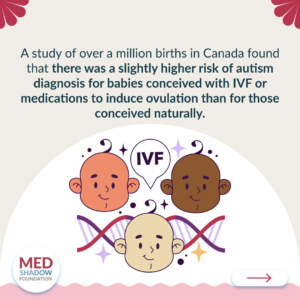
A study of over a million births in Canada found that there was a slightly higher risk of autism diagnosis for babies conceived with IVF or medications to induce ovulation than for those conceived naturally. The authors believe the increased risk may
have come from other factors such as the heightened likelihood of multiples, preterm births and cesarean births in the groups that experienced infertility.29
Natural IVF VS. Stimulated IVF
Frequently Asked Questions About IVF
How Common Is Infertility and What Causes it?
Experts define infertility as having unprotected sex for 12 months without getting pregnant or for 6 months in people aged 35 or older. About 10 to 15% of couples have trouble conceiving a child.4
People may have difficulties getting pregnant for a variety of reasons, including
- Hormonal disorders such as PCOS
- Endometriosis
- Fallopian tube damage resulting from pelvic inflammatory disease
- Side effects of treatments for other conditions, such as radiation* therapy for cancer
- Older age (women have fewer eggs and men produce less sperm as they age)
- Carrying excess weight or not having enough body fat
- Smoking
- Genetic factors
- Low sperm counts or sperm with low motility
- Unknown reasons
*Some people will choose to have their eggs or sperm extracted and frozen before undergoing certain procedures or receiving cancer treatments that might threaten their fertility. They would then later have the option to conceive a child through IVF or via a surrogate pregnancy once their treatment is complete.30
Of course, people who are single or in same-sex relationships sometimes use IVF to have children in the absence of infertility issues.
Does IVF Get You Pregnant?
The goal of IVF is to get you pregnant and allow you to carry that pregnancy to term. However, that doesn’t mean the procedure is guaranteed to work.
The Society for Assisted Reproductive Technology found in 2018 that women under the age of 35 who had IVF had a live birth after one egg retrieval 47.6% of the time. For women aged 35 to 37, the success rate was 30.7%. For women aged 38 to 40, the rate was 21.7%. For those 41 to 42 years old, the rate dropped to 10.4%, and for those over 42, it was even lower at 3.1%. Some women undergo multiple rounds of IVF if the first one doesn’t lead to a successful pregnancy and live birth.,4
Is IVF Painful?
The egg retrieval procedure can cause some pain. Doctors typically offer women anesthesia during this part of the procedure.31 But there can be some lingering pain, bloating and cramps for a few days after the retrieval.6 A patient named Nina told MedShadow that she felt “some mild discomfort afterwards for like a day or two – just some cramping – but other than that, it was business as usual.”
There’s a technique called endometrial injury or scratching in which the doctor scratches a woman’s endometrium before implanting the embryo in hopes of improving the likelihood it will implant in the wall of the uterus. The procedure is known to cause some pain and bleeding, but a 2021 Cochrane review of 38 clinical trials found their results were inconsistent. They were unable to prove that endometrial injury increases the chances of a live pregnancy with IVF.32
Why Is IVF Considered High Risk?
It can be difficult to tease apart the risks of IVF and the technology itself, as well as the effects of conditions that lead one to use the technology, such as PCOS, endometriosis, unexplained lowered fertility, older age, low sperm counts, and low sperm motility.33
Your doctor won’t consider your pregnancy high risk based only on the fact that you conceived through IVF, but the risks are higher if you are having multiple babies at once (which is more likely with IVF) or you have other risk factors.6
Reviewing hospital data, researchers found that women who gave birth to twins conceived via IVF had higher risks of cesarean delivery, gestational diabetes, gestational hypertension, preeclampsia, eclampsia, dystocia, and postpartum hemorrhage than those who gave birth to single babies or twins without IVF.34
Even if you are carrying one baby, you may be more likely to experience placental complications, such as placenta previa,35 in which the placenta covers the cervical opening and raises the risk of postpartum hemorrhaging or preterm birth, according to a 2024 study. In the study, 1.8% of people who used assistive reproductive technologies experienced placenta previa compared to 0.8% of those who were subfertile but managed to conceive naturally, and 0.7% of those who used drugs to induce ovulation but didn’t use IVF.36

Emotional Support for IVF
Patients who spoke to MedShadow described IVF as an emotional rollercoaster. It’s important to find support in your family and friends as you go through this process.
Making connections on social media sites may improve your IVF outcomes. In a small 2022 study, researchers found that women undergoing IVF who posted three times a week or more on Facebook had fewer miscarriages than their counterparts who did not use social media.37
In addition to reaching out to family and friends, there are many support groups on social media. Another place to find support is MedShadow’s Communities. There, you can find and discuss medications, side effects, and lifestyle strategies to stay healthy with other engaged patients.


